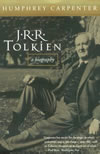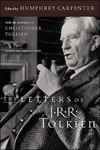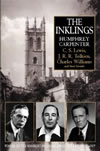Humphrey Carpenter dies (06.01.05 by Pieter Collier) - Comments
On 4 January 2005 Humphrey Carpenter, 58, died after a long illness. He was known as a writer and broadcaster, and especially renowned for the "authorised biography of Tolkien", "the Letters of J.R.R.Tolkien" and "Inklings: C.S.Lewis, J.R.R.Tolkien, Charles Williams, and their Friends".
Humphrey Carpenters life
Humphrey Carpenter joined the BBC from university as a general trainee
in 1968, and worked for several years as a local radio producer and presenter
in his home city of Oxford. At BBC he was responsable for Tolkien programs.
He finally left the BBC staff to write the authorised biography
of J.R.R. Tolkien, that was published by Allen&Unwin in 1981.
The biography is based upon the letters, diaries, and other personal papers
of the late Professor J.R.R.Tolkien and tells the story of Tolkiens life.
This book proved to be the beginning of a busy career as an author - among
the other lives he has written is that of Benjamin Britten - and he also
wrote the highly successful series of Mr Majeika children's books.
Humphrey said he was 'gradually lured back' into radio to present various
arts programmes; he introduced the very first edition of Radio 3's Night
Waves in 1992. Soon afterwards he found himself presenting the occasional
edition of In Tune - 'a very daunting experience at first,' he said, 'because
at the time I felt I knew next to nothing about classical music.'
In fact he had played the tuba in school and student symphony orchestras,
not to mention dabbling in percussion, double bass, trombone, piano and
even organ ('but I can't pedal properly with my feet'). He also ran a
1920s and 1930s style dance band, Vile Bodies, from 1983 to 1990, which
was resident at London's Ritz Hotel for many years - Humphrey wrote a
large proportion of the band's arrangements.
According to Who's Who, Humphrey's own hobbies were sleep, and 'exploring
decayed railway junctions'. Let him sleep in peace! Humphrey
died on 4 January 2005 after a long illness.
Tolkien related books by Humphrey Carpenter
Tolkien: A Biography
Tolkien could have no better biographer than Humphrey Carpenter, a fellow
Oxfordian and friend, an indefatigable researcher with a lively pen and
an ebullient sense of humor, and himself a youthful reader of The Hobbit
and the later Tolkien works.
For his biography, Carpenter was able to meet personally with Tolkien
before his death. He also had full access to all of tolkien's papers and
letters at Oxford. He was able to talk with many of tolkien's friends
and family. Because of this, Carpenter is able to present a very accurate,
extremely reliable, and very personal biography. The man who created Middle
Earth was human, and Carpenter captures this brilliantly.
> more on
this title
The Letters of J.R.R. Tolkien
Tolkien was a prodigious letter writer all his life; the sheer mass of
his correspondence would give pause to even the most stalwart archivist
(one shudders to think what he would have done with e-mail). But with
the able assistance of tolkien's son Christopher and a healthy dose of
determination, Carpenter manages find the cream of the crop--the letters
that shed light on tolkien's thoughts about his academic and literary
work, as well as those that show his more private side, revealing a loving
husband, a playful friend, and a doting father. The most fascinating letters
are, of course, those in which he discusses Middle-Earth, and Carpenter
offers plenty of those to choose from. Tolkien discussed the minutia of
his legend--sometimes at great length--with friends, publishers, and even
fans who wrote to him with questions. These letters offer significant
insights into how he went about creating the peoples and languages of
Middle-Earth.
> more on this
title
The Inklings: C. S. Lewis, J. R. R. Tolkien, Charles Williams,
and their friends
For years, a small number of Oxford dons and fellows, as well as some
of their friends, met in a local pub on Tuesdays to drink beer, hold discussions
on such matters as mythology, morality, and literature, and read aloud
the things they had been writing. Perhaps more important than these meetings
were the Thursday night gatherings in the rooms of CS Lewis at Magdalen
college. This group, which included such intellectual giants as
Lewis, JRR Tolkien, and Charles Williams, was known as "The Inklings."
Much of "The Hobbit," "The Lord of the Rings," and
Lewis's Space Trilogy were read in these meetings. Lewis also read much
of his apologetic work to the group. The Inklings have had an enormous
effect on the world of fantasy and Christian apology, and this biography
by Humphrey Carpenter attempts to examine, in detail, just what occurred
at these meetings, and what the effect was on those who participated.
Collectable books by Humphrey Carpenter
Some of the "Letters of J.R.R.Tolkien" First edition, first state, have page 406 preceding page 407 and page 429 preceding page 428. The mistake was noticed by the publishers, who returned the print run to the printers for correction. An unknown number of copies, however, were not returned - these were used as review copies and are highly collectable these days. When copies show up on the market be ready to pay at least 500$ for them.
References
- Letters of J.R.R. Tolkien by Humphrey Carpenter and Christopher Tolkien, George Allen & Unwin.1981.
- Author and Broadcaster Carpenter Dies, scotsman.com.
- Mr Majeika creator dies at home, BBC News World Edition.
Spread the news about this J.R.R. Tolkien article:


